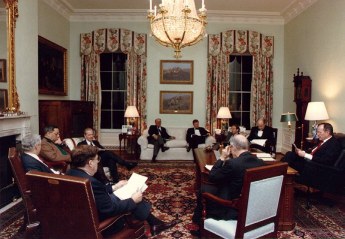
After the resolution of the Iran/Iraq war, Iraq was in severe debt. This debt was undoubtedly a major motivating factor in Saddam’s decision to invade Kuwait.

What is important to understand about Saddam’s invasion of Kuwait is that right up to the invasion American leadership was giving him every sign that he was an American golden child. Four days prior to Saddam's invasion of Kuwait the American Ambassador to Iraq, April Glaspie, told Saddam that, “We have no opinion on your Arab - Arab conflicts, such as your dispute with Kuwait. Secretary (of State James) Baker has directed me to emphasize the instruction, first given to Iraq in the 1960's, that the Kuwait issue is not associated with America. "
There is more to this statement then what appears on the surface though. April had never met Saddam before, and when she was called by Saddam to meet she had apparently not been given any specific advice by Washington on the matter. She was basically giving the Washington party line on the matter, but that is significant in and of itself. April was made into a scapegoat on the matter of the American attitude towards Iraq prior to the Iraqi invasion of Kuwait. Basically leaders like Bush and Cheney took the position that those statements did not properly reflect the American position.
Well, if that is the case then it’s their job to make sure that our Ambassadors are knowledgeable of the American position in matters of such critical importance. Tensions in the area were well known, any Ambassador would have been properly advised as to what to tell Saddam had the administration wanted to make sure a message that properly conveyed the intent of the administration would be given to Saddam. In other words, its not April’s fault, it’s the fault of the administration that this is what Saddam was told.
Other actions of the Bush administration after the invasion of Kuwait make a strong case that Saddam was baited into the invasion of Kuwait on purpose in order to give he Bush administration an excuse to use military force against Iraq, which had become a growing power in the Middle East through US assistance.
After the invasion of Kuwait there was a strong opinion in the intelligence community, as well as the Middle Eastern community, that the invasion of Kuwait by Saddam should be handled in an Arab context, not by Western powers. The Saudi defense minister noted immediately that the Kuwaiti situation should be handled by the Arab community and was against foreign intervention.
A proposal was quickly put forward by the Saudis that could have produced a peaceful withdrawal of Saddam’s forces from Kuwait. The proposal was for Kuwait to allow Iraq to remove two Kuwaiti islands that were blocking the entrance to Iraq’s seaport. The islands were barren islands that were owned by Kuwait; they did nothing for Kuwait and they blocked the precious little access that Iraq had to the sea.
The proposal was seen as a face saving measure for Saddam that would allow him to withdraw from Kuwait and still declare a victory. At the same time the action would have provided assistance to the Iraqi economy.
The opinion of James Adkins, attaché at the U.S. Embassy in Baghdad from1963-1965 and later U.S. Ambassador to Saudi Arabia, was that the Bush administration, most likely President Bush himself, placed a call to King Fahd advising him to have the Saudi Sultan withdraw his suggestion.

President Bush meeting with King Fahd to discuss Iraq
on November 21, 1990
This was done and the Sultan made no more public statements on the matter.
The reasoning behind this was that the Bush administration wanted the war to go forward. In fact there were several indications that Saddam was going to pull out of Kuwait without a fight. There were several offers for conditional withdrawal, which were rejected by the United States.
Once the plans for war were underway every action was taken to make sure that Saddam would not commit a peaceful withdrawal so that military action would be able to go forward.

Bush administration meeting on February 21, 1991 to
discuss an offer made by Iraq to withdraw from Kuwait
Saddam is definitely to blame here though. Saddam could have withdrawn from Kuwait at any time and spared the attack. Of course he felt that he could not do it unless he got something out of the deal, which America was justifiably not going to let happen.
Basically, America had been looking for a good excuse to gain a stronger military presence in the Middle East for 50 years and this was the perfect excuse, the Bush administration wasn’t going to let it slip away. At the same time, it was in the interest of all of the developed world, and much of the Arab world, not to let Iraq become any stronger, which is why a coalition was able to be put together, basically everyone wanted to keep Iraq down.
Essentially, Iraq was becoming too powerful. Despite its setbacks during the Iran/Iraq war Iraq was still a “well run” and progressive country in 1990. The Iraqi people were well educated, healthcare was good, and the military strength of Iraq was still strong. On top of that the Bush administration was well aware of the Iraqi Weapons of Mass Destruction programs because America was partly responsible for the development of the Iraqi weapons programs.
Because of all these factors, the Bush administration was intent on being able to destroy Iraqi infrastructure as well as significantly hurting the Iraqi military in such a way that Iraq would be greatly set back developmentally so that Iraq would not be able to become increasingly successful, at least not under Saddam.
There was no attempt to overthrow Saddam at the time because it was felt that it may destabilize the region, and because there had not been enough time to put together a satisfactory replacement government. There were many other political issues involved as well, such as George Bush’s fear that American casualties in a push towards Baghdad would lower his popularity rating and hurt his chances at re-election.
That’s all I’m going to cover directly on Iraqi history because the rest is present information that can be readily obtained through the internet or other information sources, and because like many other issues that I have glossed over, it would require a book to do the issue justice.
Here are a few key links on the Iraqi situation:
Iraqi timeline:
http://www.scn.org/wwfor/iraqhist.html
| Previous | Next | Contents |
|
| ||||||||||||||||